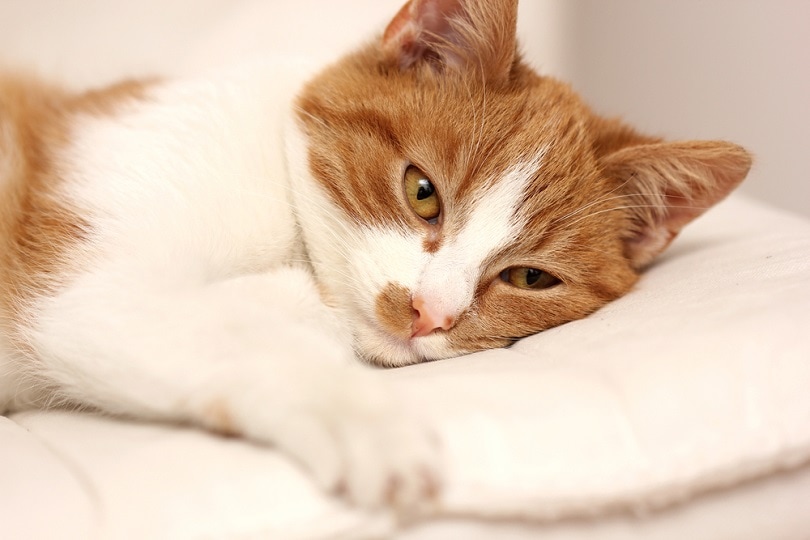
Cats spray for various reasons, but the most common reasons are that they are either trying to mark their territory or they want to communicate their reproductive status to potential mates. If your cat feels like his territory is being threatened – whether it’s another animal or a new person in the home – he may start spraying. Yes, male and female cats spray but males are more likely to do this behavior.
Spaying and neutering cats can help prevent or stop this behavior, but there are other things you can do to keep your cat from spraying as well. Make sure all cats in the home have their own litter box and food bowl, provide plenty of scratching posts for them to scratch, and keep your home clean so that your cat doesn’t feel the need to stake out his territory. Let’s learn more about why cats spray and what you can do about it.
What Is Spraying?
Spraying is when a cat backs up to a vertical surface with their tail erect and squirts urine. This usually happens on surfaces like walls, doorways, or furniture. It can also happen on horizontal surfaces like your bed or the floor.
Spraying is different from urinating. When cats urinate, they will squat and release a small amount of urine on the ground. This is usually done to relieve themselves.

Do Both Male and Female Cats Spray?
Male cats are more likely to spray than females, but both genders can do it. Unneutered males are the most likely to spray, but even neutered and spayed cats may spray if they feel their territory is being threatened.
Why Do Cats Spray?
There are a few reasons why cats spray:
How Can I Stop My Cat from Spraying?
If your cat is spraying, there are a few things you can do to stop it. The best thing to do is to have your cat spayed or neutered. This will help reduce the urge to spray. You can also try providing more litter boxes and scratching posts in your home and keeping your home clean. If your cat is spraying due to stress, try to identify the source of the stress and remove it if possible. You can also talk to your veterinarian about anti-anxiety medication for your cat.
How Does Spaying and Neutering Affect Spraying?
Spaying or neutering your cat is the best way to prevent spraying. This is because it reduces the hormone levels that can trigger the urge to spray. If your cat is already spraying, spaying or neutering may not stop it immediately, but it will usually help over time. You may also want to consider getting your other cats spayed or neutered, even if they’re not spraying. This can help reduce the chances of your cat feeling the need to spray due to territorial reasons.
Spraying vs Other Types of Problem Urination
It’s important to note that spraying is different from other types of problem urination. If your cat is urinating outside of the litter box, it could be a sign of a medical problem and you should take them to the vet right away. Other types of problem urination can also be due to stress, but usually, only happen once or twice. If your cat is urinating frequently outside of the box, it’s more likely to be a medical problem.
Medical Conditions That Can Cause Urination Problems
There are a few medical conditions that can cause urination problems in cats. These include:

Cleaning Tips to Get Rid of Strong Cat Odors
If your cat has already sprayed, there are a few things you can do to clean it up and get rid of the smell. First, remove any solid waste from the area. Then, soak up as much of the urine as possible with paper towels or a cloth. You can also use a wet/dry vacuum if you have one.
Once you’ve soaked up as much of the urine as possible, clean the area with a pet-safe cleaner. There are a number of cleaners on the market that are specifically designed to remove pet stains and odors. You can also make your own cleaner by mixing one part white vinegar with three parts water.
After cleaning the area, be sure to block off the area so your cat can’t get to it. You may need to do this for a few weeks until the scent of the urine is gone. You can also try using a pheromone diffuser in the area, which can help reduce your cat’s stress levels.
Be sure to wash any towels or clothing that comes in contact with the urine. If the smell is still lingering, you can try spraying the area with a pet-safe odor eliminator.
Our favorite enzyme cleaner is the Hepper Advanced Bio-Enzyme Pet Stain & Odor Eliminator Spray because it permanently removes even the very worst pet stains and smells you can imagine (and makes clean-up a breeze). They even offer a 100% satisfaction guarantee! Click here to order a bottle and freshen up your home today.
- ADVANCED ENZYMATIC CLEANER - Penetrates the most stubborn smells and stains at the deepest molecular...
- FOR ANY MESS, ON ANY SURFACE - This pet odor eliminator cleans your carpets, floors, furniture,...
- FRESH, NATURAL ODOR - Our unique formulation doesn't rely on dangerous or unpleasant chemical...
At Pet Keen, we’ve admired Hepper for many years, and decided to take a controlling ownership interest so that we could benefit from the outstanding products of this cool cat company!
Cat Spraying FAQs
Do all male cats spray?
No, not all male cats spray. However, most males that do spray are not neutered.
Will neutering my cat stop him from spraying?
In most cases, yes. Neutering will reduce the hormone levels that can trigger the urge to spray.
My cat is urinating outside of the litter box. Is this spraying?
No, spraying is different from other types of problem urination. If your cat is urinating frequently outside of the box, it’s more likely to be a medical problem, but behavioral issues are also a possibility.
Image Credit: Anlomaja, Shutterstock
Is there anything I can do to prevent my cat from spraying in the first place?
The best way to prevent your cat from spraying is to have him neutered. This will reduce the hormone levels that can trigger the urge to spray. You can also try using a pheromone diffuser in your home, which can help reduce your cat’s stress levels.
Can I train my cat not to spray?
No, you cannot train your cat not to spray. This is an instinctive behavior. If you try to punish your cat for spraying, they’re more likely to spray anyway, but their trust in you can be negatively impacted.
Conclusion
Spraying is a normal behavior for cats, but it can be a problem if it’s happening in your home. If your cat is spraying, the best thing you can do is to have them spayed or neutered. This will help reduce the hormone levels that can trigger the urge to spray. You may also want to consider getting your other cats spayed or neutered, even if they’re not spraying. This can help reduce the chances of your cat feeling the need to spray due to territorial reasons. If the problem persists, you can try cleaning the area with a pet-safe cleaner and using a pheromone diffuser to help reduce your cat’s stress levels.
Featured Image Credit: Elisa Putti, Shutterstock










